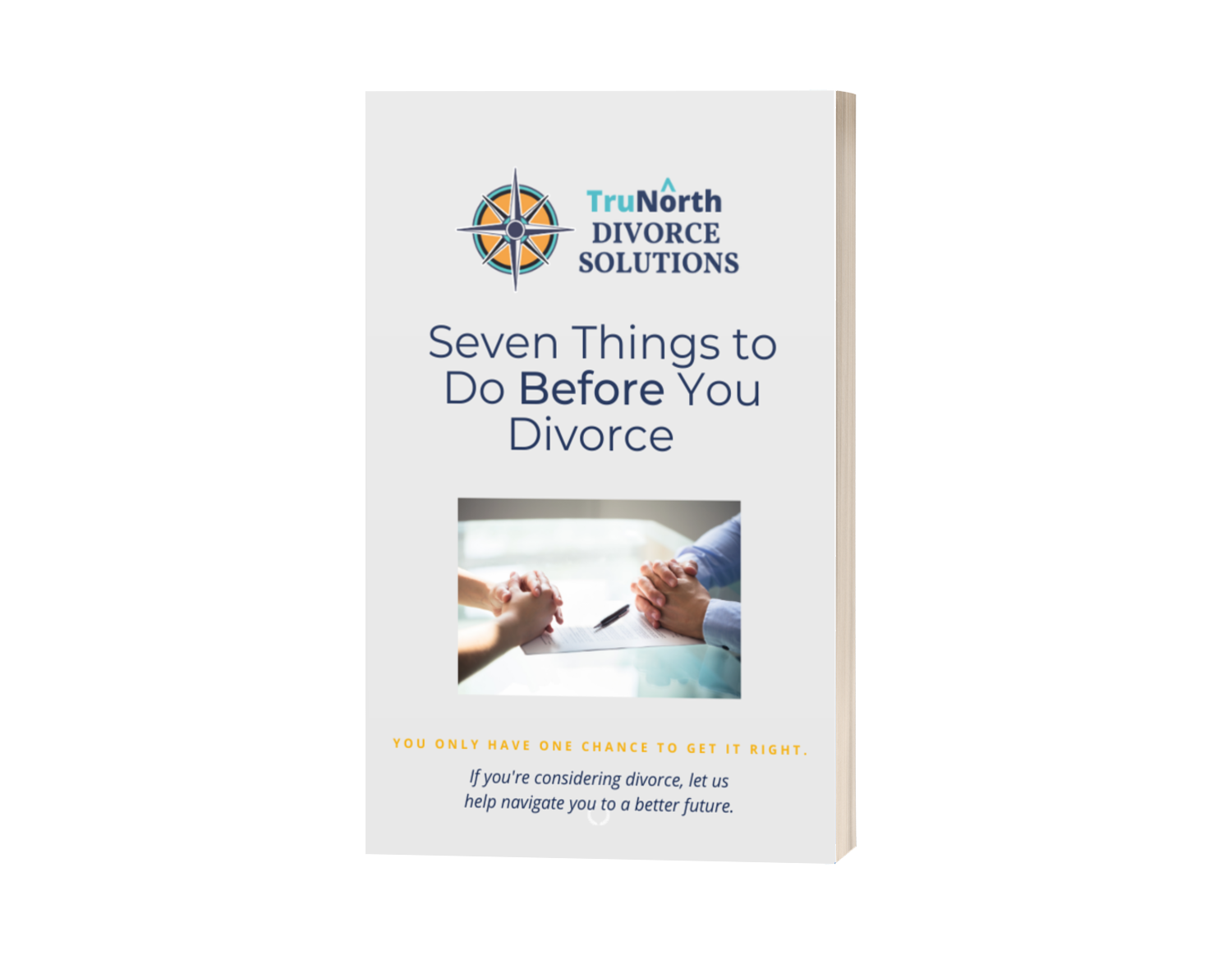SEVEN THINGS TO DO BEFORE YOU DIVORCE
Get Our FREE eBook!


Did you know that there are basically three kinds of divorce mediators? There are lawyer mediators, therapist mediators, and financial mediators.
Most people new to divorce think first of lawyer mediators. Lawyers are experts at navigating divorce through the courts: filing petitions, presenting at hearings, filing motions, and arguing cases before hearing officers and judges. If you’re meditating your divorce, though, there isn’t much that a lawyer can bring to the table other than knowledge of the filing procedure and state guidelines and these are readily available to all. Lawyers aren’t allowed to provide the couple with legal advice, either. Regardless of your choice in mediators, it’s a good idea to hire an attorney as a consultant to get legal advice and review your settlement agreement before signing.
Second, therapist mediators are specially trained in various mental health areas and are useful as divorce mediators when there are special circumstances, e.g., complex custody issues or personality disorders. They do not possess financial expertise, nor can they help with legal documents or divorce processing. On the other hand, you may want to utilize a divorce coach to help you stay on track throughout the divorce process and be more effective in your negotiations.
Financial mediators, specifically Certified Divorce Financial Analysts® or CDFA-mediators, bring divorce financial expertise to the table, helping couples determine an optimal divorce settlement. They can provide the couple with financial advice that neither lawyers nor therapists are equipped to do. Working with a financial mediator facilitates:
So be aware that there is more than one type of mediator option and that your first leaning may not be the best choice for your situation. Book a complimentary, private consultation to learn more.
In a recent post, I addressed the notion of “winning” at divorce. There are many lawyers who claim they can do just that, and they will be happy to take your hard-earned money while they fight your war for you. The reality is, in the vast majority of cases, you’ll wind up no better off than if you’d negotiated to begin with, and all the while you’re funding your lawyer’s kids’ college education instead of your own.
Winning might instead be viewed as getting through this divorce transition with integrity, keeping more of your own money, and maintaining your and your children’s emotional health throughout. Ideally, you’ll do this without ever stepping foot into a courthouse or even speaking to an attorney.
So, how do you get better outcomes, at a lower cost and without judges, courts, or even lawyers? If you have minor children and marital assets, don’t attempt a do-it-yourself divorce unless you want to risk costly mistakes that cannot later be reversed. If you want an easy, affordable, and legal solution, seek a qualified divorce mediator.
You will want to find a mediator who has the knowledge, skills, and experience to guide you and your spouse to a financially optimized settlement agreement and, if applicable, with a parenting plan that preserves the integrity of your family. A mediator with the divorce financial expertise of a Certified Divorce Financial Analyst (CDFA®) is ideal.
How, though, to address the legal piece of your divorce? You will find that legal agreements and divorce papers are straightforward in a mediated case. These can be easily facilitated by your mediator so that you never even have to work directly with an attorney to process your divorce. (It’s never a bad idea, though, to have an attorney review your agreements before they are finalized, and this can be done at a minimal cost.)
Rationally approaching your divorce, along with a dose of grace, can result in a lower-cost and faster process while addressing your financial needs and preserving your family’s emotional well-being. Now, wouldn’t you agree this would be a “win” at divorce?
Are you contemplating divorce or in the early stages of divorce and determined to get or keep as much as you can, leaving your spouse with as little as possible? If so, you’ll easily find a divorce attorney who will fight your war with you for years. And you’ll only end up where you would have if you’d negotiated to begin with. And guess what—you’ve funded your lawyer’s kids’ college accounts rather than your own. Is this a “win” at divorce?
Perhaps you should instead consider getting through this overwhelmingly difficult transition with dignity while keeping a lot more of your own money and maintaining your and your children’s emotional health throughout. In most instances, you can do that without ever stepping foot into a courthouse or even speaking to an attorney.
The fact is that ninety percent of divorces don’t belong in the court system. When you involve the court, you give up total control around life-altering decisions regarding your assets, your income, and the custody of your children. Whether within or outside of court, if you involve an attorney for both you and your spouse—the traditional model—it will result in legal expenses that you can’t possibly fathom when you’re 1) just getting started and 2) convinced the “system” will see your side of what’s just. Attorney-driven divorce processes will not provide you with practical guidance and needed emotional support nor correctly value all your assets and considers both the short and long-term impact on each spouse’s financial health.
I set out years ago to find a better way to divorce, creating and refining a process to deliver just that. At TruNorth Divorce, we provide a legally-sound, one-stop solution for divorcing couples who want a financially optimized settlement that helps both spouses achieve their long-term goals. When children are involved, we also provide effective and durable parenting plans. Yes, there is indeed a better way that will be less expensive, faster, less stressful, minimize the negative impact on your children, and launch you towards a new and promising future.
Want to know more? Read How to Win in Divorce.